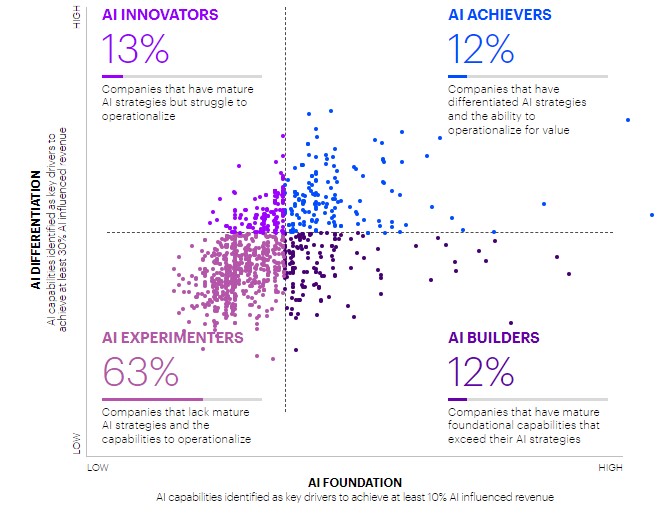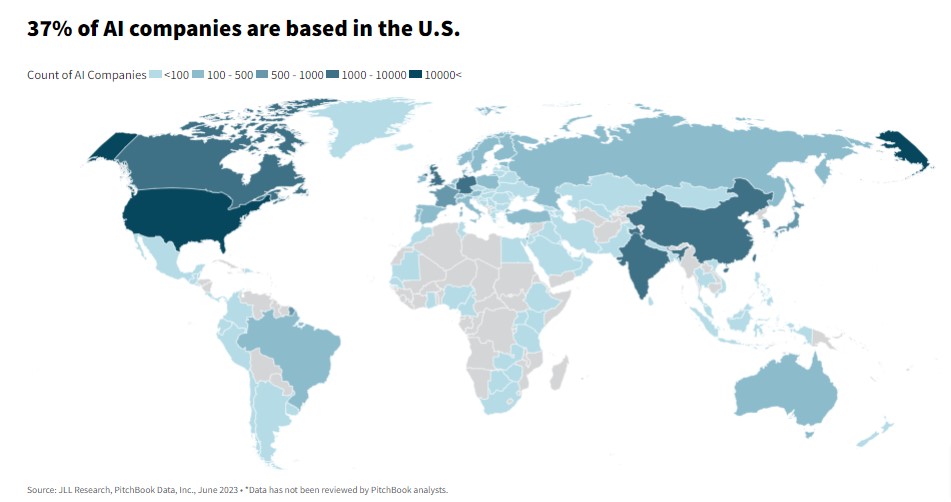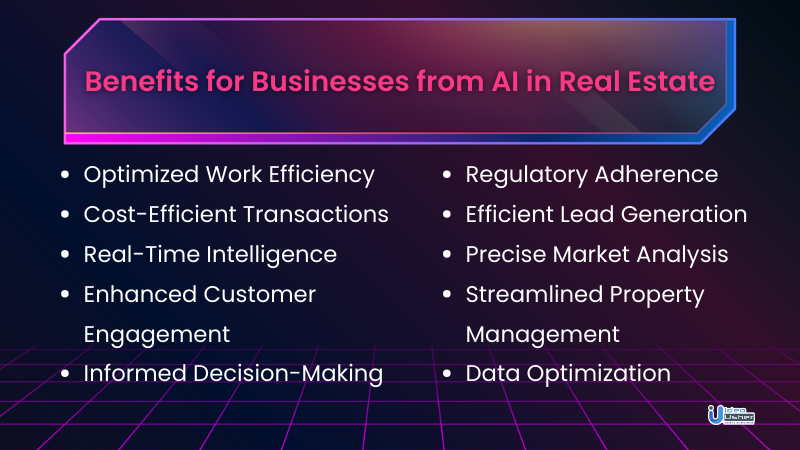
Artificial Intelligence (AI) is more than just a buzzword; it’s a transformative force in the real estate industry. This advanced technology is reshaping how we navigate the complex world of property acquisition and rental markets. Think of AI as your reliable guide, leading you through this intricate landscape with precision. It serves as your diligent assistant, automating routine tasks, enhancing customer experiences, and supercharging productivity. Moreover, AI acts as your insightful advisor, offering invaluable insights to strengthen decision-making. The real estate sector is only beginning to unlock AI’s boundless potential. From predictive behavioral analysis and trend forecasting to streamlining property management and optimizing investment portfolios, AI is ushering in a new era of possibilities and opportunities. So, buckle up as we delve deeper into the fascinating world of AI in real estate, exploring its use cases, examples, and benefits. Stay tuned!
- Role of Artificial Intelligence in the Real Estate
- AI In Real Estate: Market Insights
- Top 10 Benefits for Businesses from AI in Real Estate
- 18 Use Cases with Real-world Examples of AI in the Real Estate
- Top 9 Real Estate Companies Utilizing AI in 2023
- AI-powered Tools in Real Estate
- Case Study: How AI Provides a Competitive Edge in Real Estate
- Act Now: Using AI Wisely and Responsibly
- How Can Idea Usher Help You?
- FAQ
Role of Artificial Intelligence in the Real Estate
1. Boosting Efficiency
AI tools like smart software and automation streamline tasks for real estate professionals, allowing them to work faster and more productively, thereby increasing their overall efficiency and effectiveness in the industry.
2. Saving Money
AI’s capacity to optimize processes and reduce errors translates into substantial cost savings within real estate transactions. This means reduced expenses and more budget-friendly deals for clients and stakeholders.
3. Future-Ready Facility Management
AI is on the brink of transforming facility management in real estate. It promises to automate building operations, maintenance, and security, ensuring properties run smoothly and efficiently while also reducing operational costs.
4. Taming Big Data
AI excels at managing and analyzing the vast volumes of data present in the real estate sector. It can identify trends, assess property values, and pinpoint lucrative investment opportunities, offering valuable insights to real estate professionals.
5. Data Mastery
AI’s ability to collect, organize, and interpret property data empowers real estate professionals with the knowledge they need to make informed decisions. This data-driven approach enhances their ability to thrive in a competitive market.
6. Smart Security and Energy
AI plays a pivotal role in enhancing building security and energy efficiency. It monitors and controls critical systems such as fire safety and security, resulting in safer, greener, and more cost-effective real estate properties.
7. Predicting the Future
Real estate experts leverage AI’s predictive capabilities to gain a precise understanding of market conditions. This empowers them to evaluate property values accurately and identify profitable investment prospects with confidence.
8. Fairer Deals
AI contributes to fairer real estate transactions by removing biases. It relies on impartial data analysis to make decisions, ensuring that deals are based on objective criteria rather than subjective judgments.
9. Simplifying Hiring
AI simplifies the hiring process for real estate firms, making it easier to find and recruit top talent. This enables businesses to operate smoothly, grow efficiently, and provide excellent service to their clients.
AI In Real Estate: Market Insights
Recent data from Accenture sheds light on the impact of AI in the corporate world. Among the top executives of the world’s 2,000 largest companies, those who discussed AI in their earnings calls saw a 40% higher chance of boosting their company’s stock prices. This is a significant jump from the 23% reported in 2018. However, only 12% of these companies have fully embraced AI, achieving ‘superior growth’ and substantial business transformation. Interestingly, this elite group of “AI achievers” attributes 30% of their total revenue to AI initiatives.
AI maturity can be defined as an organization’s ability to master AI-related capabilities effectively, and Accenture classifies companies into four categories based on their AI maturity:

It can be observed that only 37% of organizations surveyed are in the Achievers, Builders, or Innovators categories, with Achievers comprising 12%, Builders 12%, and Innovators 13%. As AI continues to gain momentum, more organizations are investing in it, with 63% expecting increased AI budget allocation in the next three years.
The expanding AI landscape is set to thrive in specific technology hubs.
While foundational model creators like OpenAI are essential, they represent only a fraction of the AI ecosystem. This ecosystem includes companies engaged in semiconductor hardware, cloud computing platforms, model repositories, and application development, all of which are on the rise. The potential for commercial real estate becomes even more promising when we consider the emergence of additional companies that will customize pre-trained foundation models for specific purposes.
In 2022, AI investments were primarily channeled into the medical and healthcare sector, closely followed by data management, processing, cloud computing, and Fintech. Furthermore, there’s a significant opportunity in enterprise applications for generative AI, with forecasts predicting a value of $42.6 billion in 2023. With an anticipated compound annual growth rate (CAGR) of 32%, this market is projected to reach $98.1 billion by 2026 (according to PitchBook’s Vertical Snapshot: Generative AI; 2023). JLL’s research indicates that this AI growth will likely translate into increased demand for real estate, potentially reaching 1.6 million square meters in the US alone by the end of this year.

AI-powered solutions for a range of real estate functions
The real estate industry is actively embracing new technologies, with more than 80% of occupiers, investors, and developers planning to boost their technology budgets in the next three years, as per JLL’s 2023 Global Real Estate Technology Survey.
This push is underpinned by the maturation of the PropTech ecosystem. It now offers solutions for nearly every facet of real estate, from investment management to design, construction, operations, and portfolio management. This provides a solid base for incorporating AI.
Worldwide, over 500 companies are providing AI-driven services to real estate, delivering increased efficiency and cost savings.
Key AI applications include:
- Organizing documents and standardizing data for portfolio analytics.
- Mining IoT data for automated facility management.
- Predicting prices for investment management.
- Processing satellite images for asset valuation and risk assessment.
- Capturing real-time data for construction site monitoring.
- Streamlining schedules for construction projects.
- Providing recommendations for leasing and investment deals.
Generative AI applications in real estate are in their early stages, covering areas like client communication, floor plan design, and summarizing documents for reports. More innovations are on the horizon, with Large Language Models playing a vital role in simplifying complex, multilingual operations.
Early AI adopters are already reaping rewards, such as Royal London Asset Management, which achieved impressive ROI and energy savings through AI-powered solutions, notably reducing carbon emissions.
Furthermore, the AI in Real Estate Market is projected to attain a value of US$1,335.89 billion by 2029, growing at a rate of 35% annually throughout the forecast period.

Top 10 Benefits for Businesses from AI in Real Estate

Here’s a more detailed elaboration of each of the ten benefits of AI in the real estate sector:
1. Optimized Work Efficiency
AI automates repetitive tasks such as data entry and paperwork, liberating professionals to focus on core responsibilities while achieving tasks faster and with fewer errors.
2. Cost-Efficient Transactions
AI streamlines processes, reducing transaction costs through automation. This includes tasks like document verification, contract management, and even property valuation, which can significantly trim expenses.
3. Real-Time Intelligence
AI’s data analysis prowess offers real-time market insights, enabling professionals to swiftly adapt to shifting trends, pinpoint investment opportunities, and make well-informed decisions.
4. Enhanced Customer Engagement
AI-driven chatbots and personalized services provide customers with round-the-clock support, answering queries promptly and fostering positive relationships.
5. Informed Decision-Making
AI analyzes historical data to predict maintenance requirements and energy efficiency upgrades. This helps in making strategic decisions to enhance property value.
6. Regulatory Adherence
AI aids in monitoring and ensuring adherence to evolving regulatory standards, particularly vital in the context of ESG (Environmental, Social, and Governance) requirements.
7. Efficient Lead Generation
AI-powered lead scoring systems distinguish between serious buyers and casual browsers, enabling real estate professionals to focus their efforts on high-potential leads.
8. Precise Market Analysis
AI harnesses vast data pools to provide in-depth market analyses. Professionals gain accurate insights into property values, rental trends, and local market dynamics.
9. Streamlined Property Management
AI automates routine property management tasks, such as tenant screening, rent collection, and maintenance requests. This optimizes resource allocation and reduces operational hassles.
10. Data Optimization
AI efficiently processes the overwhelming volume of real estate data. It identifies patterns, buyer-seller matches, and investment opportunities, diminishing the need for intermediaries and expediting property transactions.
These multifaceted benefits underscore AI’s transformative role in the real estate sector, offering a gamut of improvements across various dimensions of the industry.
18 Use Cases with Real-world Examples of AI in the Real Estate
1. Behavioral Analysis and Trend Prediction
AI analyzes user behavior patterns, such as property searches and viewing history, to predict upcoming market trends. This enables real estate professionals to proactively adapt their strategies and offerings.
Real-world Example
Companies like LionDesk, WiseAgent, and Property Base use machine learning algorithms to analyze interactions, preferences, and behaviors.
2. AI-Powered Chatbots
AI-driven chatbots provide immediate responses to customer inquiries, delivering round-the-clock support. They use natural language processing to understand and address customer questions, enhancing the real estate customer experience.
Real-world Example
Tidio utilizes conversational AI to revolutionize customer support in the real estate industry. It can engage with potential buyers, answer customer questions, schedule property tours, and provide hyper-personalized recommendations.
3. Generative AI for Content
AI generates a wide range of content, including property descriptions, marketing materials, and listings. This automation saves considerable time and resources for real estate marketing teams, ensuring consistent and engaging content.
Real-world Example
PropertySimple uses AI for content marketing. This property social media advertising tool designs creative property ads across social media platforms.
4. Personalized Property Recommendations
AI leverages individual preferences and historical interactions to offer tailored property recommendations. This streamlines the property discovery process for potential buyers, increasing the chances of finding the perfect match.
Real-world Example
Trulia uses AI to provide personalized property recommendations and enhance user experiences.
5. Optimized Social Media Marketing
AI dives into data analytics to identify the most effective social media platforms, content strategies, and audience targeting methods. This optimization boosts the overall impact of real estate marketing campaigns.
6. Simplified Home-Buying Process
AI equips buyers with comprehensive property information, including pricing details, location insights, and feature highlights. This simplification of the decision-making process accelerates property purchases.
Real-world Example
Keyway brings technologies like AI and machine learning to commercial real estate to make data-informed deals quick and efficient through its investment platform
7. Real-Time Market Insights
AI furnishes real estate professionals with current market data and insights. This empowers them to make data-driven decisions promptly, capitalize on emerging trends, and stay competitive.
8. Enhanced Transaction Efficiency
AI automates various transaction processes, from document verification to contract management. This not only reduces operational costs but also expedites real estate transactions, benefiting both buyers and sellers.
Real-world Example
Sell2Rent showcases the power of AI in increasing efficiency, from leveraging data analytics for informed decision-making to utilizing virtual assistants for personalized customer support.
9. Automated Property Management
AI streamlines property management by automating tasks such as tenant screening, maintenance tracking, and rent collection. This automation improves efficiency, minimizes errors, and enhances the tenant experience.
Real-world Example
Companies like ButterflyMX offer features like automated reminders for staff and software integrations with access control systems so that the resident directory is automatically updated.
10. Portfolio Optimization
AI examines vast datasets encompassing property performance, market conditions, and investment objectives. Investors utilize these insights to optimize their real estate portfolios, aiming for higher returns and reduced risk.
11. Listing Descriptions Generation
AI creates property listing descriptions based on input data. This ensures consistency in property listings and saves considerable time for real estate professionals who would otherwise need to craft descriptions manually.
12. Virtual Tours
AI-powered virtual tours offer immersive property experiences. Potential buyers can explore properties remotely, gaining a comprehensive understanding of the space. This is especially valuable for properties under construction or distant locations.
13. Lead Generation
AI excels at identifying and prioritizing potential leads by sifting through data from various sources. This enables real estate businesses to allocate resources efficiently, focusing on leads with higher conversion potential.
14. Property Management Streamlining
AI acts as a central hub for property management data. It streamlines tasks such as maintenance scheduling, tracking tenant preferences, and financial management, simplifying the management of multiple properties.
15. Fraud and Compliance Detection
AI meticulously scans property listings for signs of fraud and ensures compliance with industry regulations. This reduces risks and potential legal repercussions for real estate professionals, maintaining integrity in the market.
16. Property Analysis
AI conducts in-depth property analysis, considering factors like location, amenities, and market trends. This results in accurate property valuations and investment insights, aiding buyers, sellers, and investors in making informed decisions.
Real-world Example
HouseCanary uses AI models to analyze historical data and identify investment opportunities in the real estate market.
17. Customer Support
AI chatbots provide instant responses to customer queries, offering efficient and responsive customer support. They assist with inquiries, appointment scheduling, and information dissemination, enhancing the overall customer experience.
Real-world Example
Tidio’s conversational AI revolutionizes customer support in the real estate industry by engaging with potential buyers and answering customer questions.
18. Intelligent Data Processing
AI excels at extracting and organizing data from diverse real estate documents, including appraisals, lease agreements, and loan papers. This minimizes manual data entry, reduces errors, and improves the accuracy of record-keeping and analysis.
Real-world Example
Silverwork Solutions uses artificial intelligence to build “cognitive technologies” for the mortgage industry.
Top 9 Real Estate Companies Utilizing AI in 2023
1. Zillow
Zillow, a prominent online real estate platform, harnesses AI to deliver a tailored user experience. AI powers customized search functionalities, precise home valuations (with an error rate under 2%), and natural language search capabilities. Zillow’s AI models analyze comparable properties to provide insightful results. Additionally, they employ AI to generate floor plans from user-uploaded images, enhancing property listings.
- Headquarters: Seattle, Washington, U.S
- Founded: February 8, 2006
2. Trulia
Trulia focuses on personalization through AI-driven features. It employs Apache Kafka and a robust image recognition library to enhance user experiences. Trulia’s AI algorithms refine recommendations using machine learning, computer vision, and engagement models, optimizing property search results.
- Headquarters: San Francisco, California, U.S
- Founded: 2005
3. Redfin
Redfin utilizes AI to assist sellers in achieving faster and more profitable transactions. Their AI learns buyer behavior patterns, aiding in listing optimization and personalization. It helps identify listings that attract buyers and optimize property searches for users.
- Headquarters: Seattle, Washington, U.S
- Founded: 2004
4. Compass
Compass integrates AI into its real estate agent tools. AI assists agents in lead qualification based on custom criteria, streamlining customer relationship management. The AI-powered CRM notifies agents when potential clients are actively engaging with property listings.
- Headquarters: New York, New York, U.S
- Founded: 2012
5. Keyway
Keyway introduces AI and machine learning to commercial real estate. Their platform focuses on data-driven transactions and efficiency. It caters to healthcare professionals and multifamily property owners, offering innovative service models like rent-to-own and transition solutions.
- Headquarters: New York, New York, U.S
- Founded: 2020
6. Entera
Entera revolutionizes residential real estate investing with AI-driven automation and analytics. The platform streamlines the process of finding, purchasing, and managing single-family homes. Entera services multiple U.S. markets and handles a significant transaction volume.
- Headquarters: New York, New York, U.S
- Founded: 2017
7. HouseCanary
HouseCanary harnesses the power of AI to offer cost-effective real estate valuations. By employing machine learning algorithms that analyze data spanning four decades, HouseCanary generates forecasts with a remarkable margin error of just 2.5%. This data-driven approach empowers individuals to make informed property investments and boosts customer conversion rates.
- Headquarters: San Francisco, California, United States
- Founded: 2013
8. Rex
Rex is at the forefront of AI adoption, aiming to replace traditional agents with data-driven insights. The platform tracks user behavior on its site to display personalized ads based on user interests. Rex also utilizes intelligent algorithms to analyze homeowner history data, helping identify potential buyers with precision. This innovative approach streamlines the home-selling process, offering a unique alternative to traditional real estate agents.
- Headquarters: Austin, Texas, United States
- Founded: 2016
9. Cherre
Cherre leverages AI to consolidate property data from various public and private sources, providing customers with comprehensive market insights and portfolio analysis. The company has developed an advanced AI conversational engine, known as “hunter™,” incorporating natural language processing. This engine facilitates direct 1:1 text messaging with an unlimited number of homebuyers, offering unparalleled scalability and achieving conversion rates four times higher than the industry average.
- Headquarters: New York, New York, United States
- Founded: 2016
AI-powered Tools in Real Estate
Here are some examples of AI-powered tools that are being used in the real estate sector:
1. Advanced 3D Virtual Home Tours
Platforms such as Zillow employ AI to craft immersive 3D virtual tours, catering not only to residential clients but also to commercial real estate investors who often require detailed virtual property walkthroughs.
2. Virtual Staging Solutions and House Flip Generators
AI-driven virtual staging tools breathe life into vacant properties by digitally furnishing them, captivating potential buyers, and accelerating property sales. Moreover, the Virtual House Flip tool empowers users to reimagine and renovate properties from scratch.
3. Streamlined Content Marketing Automation
AI-driven solutions like Xara Cloud take charge of end-to-end content marketing, effortlessly managing social media posts and print materials, freeing up valuable time for real estate professionals.
4. Enhanced Customer Relationship Management (CRM)
AI enhances CRM capabilities within real estate firms. Tools like LionDesk, WiseAgent, and Property Base utilize machine learning algorithms to analyze client interactions, preferences, and behaviors, streamlining communication and personalization.
5. CINC’s AI Companion – Alex
CINC, a robust lead generation and CRM platform, collaborates with Structurely AI to assist agents in converting leads. Alex, a conversational AI bot, engages and nurtures leads, significantly improving lead conversion rates.
6. Wise Agent’s AI Bot and Writing Tool
Wise Agent introduces an AI-powered lead nurturing bot that functions as a valuable sales assistant for real estate agents. This innovative tool streamlines communication and follow-ups.
7. Dippidi AI Nurturing Communications
Dippidi offers an all-inclusive platform that employs AI for generating buyer and seller leads through content marketing and paid advertising. This streamlined approach boosts lead generation efforts.
8. Lumi AI by PorchLyte
Lumi AI serves as a user-friendly real estate marketing assistant, simplifying various marketing tasks with its AI-driven capabilities.
These AI-powered tools are at the forefront of transforming the real estate industry. By automating complex processes, they enhance efficiency and productivity across diverse real estate roles, making them indispensable for professionals in the field.
Case Study: How AI Provides a Competitive Edge in Real Estate
The real estate industry is undergoing a transformative shift by embracing technology, and AI is at the forefront of this evolution. This case study explores how early adopters of AI are gaining a significant competitive advantage in the real estate sector.
a. Embracing Data-Driven Decision Making
Levin Management Corp. (LMC), a commercial real estate services provider, recognized the importance of staying ahead of the competition by harnessing the power of AI. They leveraged Placer.ai, a location analytics platform, to gain a deeper understanding of their properties’ foot traffic. This real-time data allowed them to make informed leasing decisions, assess tenant performance, and identify shopping patterns.
b. Accelerating Digital Transformation with AI
Larken Associates, a real estate development and management company, embarked on a proactive digital transformation journey. They optimized their website and adopted tech-centered software to provide interactive views, 3D tours, and drone footage. Furthermore, Larken Associates introduced an AI chatbot, offering potential customers 24/7 assistance. This chatbot enhanced customer service, providing floor plans, pricing, and occupancy information, leading to increased customer satisfaction and higher conversion rates from web leads.
c. Saving Time and Streamlining Processes
AI-driven chatbots and email bots have streamlined customer interactions and leasing processes. Larken Associates observed substantial time savings, allowing staff to focus on more customer-centric tasks and meaningful resident interactions. These AI tools reduced the workload of leasing agents and property managers, leading to increased efficiency and improved employee morale.
d. Attracting Talent and Staying Competitive
Larken Associates found that their tech-driven approach not only attracted renters but also talent. Prospective employees were drawn to a company that leveraged technology to enhance job efficiency. This competitive advantage extended beyond leasing and property management, benefiting all aspects of their organization.
e. Looking to the Future
As the real estate industry’s tech revolution continues, forward-thinking companies like LMC and Larken Associates are well-positioned to remain industry leaders. They understand that embracing AI is not just a trend but a necessity in today’s competitive landscape. By continuously adopting innovative technology, they ensure they are the ones leading the industry while others risk falling behind.
We can say that AI adoption in real estate provides a substantial competitive advantage. From data-driven decision-making to streamlining processes and attracting top talent, AI is reshaping the industry and paving the way for success.
Act Now: Using AI Wisely and Responsibly
The future impact of AI is still uncertain, with its expanding capabilities and how it will fit into various industries raising questions. It’s essential for real estate investors, developers, and corporate occupiers to be informed and strategic. They should explore how to harness AI’s power to support their business goals while doing so in an ethical and responsible manner. As AI regulations evolve to match its growth, businesses must keep a close eye on three types of emerging regulations:
- Market Standards and Protocols: These cover data quality, IP rights, privacy, and data security.
- Societal Risk Mitigation: This involves measures to protect the job market from disruptions and safety standards for autonomous vehicles.
- Environmental Legislation: Especially concerning carbon emissions from the expanding digital economy.
Organizations need to ponder several important questions as they chart their path forward: What does AI growth mean for investment and location strategies in existing or emerging asset classes? What AI applications should they prepare for and pilot now? What are the potential business and societal risks?
Understanding AI’s impact on your business and creating a testing and implementation strategy will be crucial in managing risks and unlocking growth potential.
How Can Idea Usher Help You?
We specialize in AI-related projects and offer valuable assistance in leveraging AI for business growth. With a deep understanding of the AI landscape, we provide expert guidance to help you align AI technologies with your specific business objectives. Our strength lies in creating customized AI solutions tailored to your unique needs, whether it’s optimizing operations, enhancing customer experiences, or automating tasks. Importantly, we do all this without breaking the bank, offering cost-effective AI development services to maximize your return on investment.
Our solutions prioritize user experiences with responsive design, ensuring that they function seamlessly across various devices and platforms. Real-time capabilities are a core feature of our AI applications, allowing you to make data-driven decisions on the fly. In an increasingly mobile-centric world, our mobile optimization ensures that your AI solutions are not only accessible but also user-friendly on smartphones and tablets.
By collaborating with us, you can transform your AI ideas into high-performing applications, driving sustainable growth for your business. We offer a diverse range of services, each tailored to your specific needs, making us the ideal partner for AI development. So, choose Idea Usher and convert your vision into a high-performing app.
Contact Idea Usher at [email protected]
FAQ
Q: What are some use cases of AI in real estate?
A: AI is used in real estate for various purposes, including behavioral analysis and trend prediction, automated property management, portfolio optimization, and customer support. It can also generate content, provide personalized property recommendations, optimize social media marketing, simplify the home-buying process, and offer real-time market insights.
Q: How does AI enhance transaction efficiency in real estate?
A: AI can automate many aspects of the transaction process in real estate, from document verification to contract management. This speeds up transactions and reduces the potential for human error, leading to significant cost savings.
Q: Can AI help with lead generation in real estate?
A: Yes, AI-powered platforms can sift through new leads for gems, helping real estate businesses focus their efforts on high-conversion prospects. They can analyze user behavior and market trends to organize valuable data for decision-making.
Q: How does AI contribute to property analysis in real estate?
A: AI can evaluate multiple factors to determine property values, including location, amenities, and future development prospects. It can also analyze historical data to identify investment opportunities in the real estate market.










Rebecca Lal